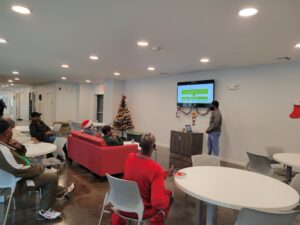Jenn Trunk had a routine physical in 2005 that showed protein in her urine. She was quickly referred to a nephrologist who did a lot of labs and eventually a kidney biopsy that resulted in a diagnosis of Minimal Change Disease. Jenn started steroid therapy and became unrecognizable both physically and mentally. Fortunately, the prednisone worked, resulting in her going into remission. However, she relapsed shortly after her daughter was born and prednisone didn’t work this time. Jenn tried every medication that was available, but nothing induced remission. Finally, another biopsy was performed, but this time the results showed FSGS.
Jenn experienced considerable side effects from FSGS. She participated in clinical trials at the University of Cincinnati and Mayo with high hopes, but nothing worked. Jenn researched dialysis modalities and she continued seeing a nephrologist to monitor her GFR that was steadily decreasing, but she continued to stay active. Jenn reports, “It felt like everything was still relatively ok…maybe I was in denial. And then one weekend I couldn’t get out of bed…I was so dizzy and nauseous and had to admit to myself that it was time to start dialysis.”
Her blood pressure stabilized, and her appetite returned. Jenn was able to gain weight back again and even started exercising. Being in control of her treatments gave her confidence in her body again. Jenn continues to exercise regularly.
She had already decided on peritoneal dialysis, so that week she had a neck catheter placed to start emergency dialysis, a chest catheter, and a peritoneal catheter. Adjusting was difficult, but Jenn made it back to working full-time and even took a vacation with her PD machine. She got listed on the transplant list and started looking for a living donor and 6 months later her friend and work colleague, Adam generously gave his kidney. Jenn was transplanted a year from her start date of dialysis. She never really entertained the idea of her disease coming back, but it did 2 days after transplant. Jenn had begun aggressive immunotherapy, Rituxan infusions and plasmapheresis treatments at Mayo Clinic, but had to start dialysis again 14 months later. The 2 years after her transplant were some of the toughest years of Jenn’s life. She had chronic bronchitis and was eventually diagnosed with a lung disease called bronchiectasis. Jenn had 3 blood transfusions, 2 sinus surgeries and a bilateral nephrectomy. She lost a significant amount of weight and was quite ill from it all.
But Jenn just kept going. She chose nocturnal home hemodialysis this time but had to start in-center until she completed training. In-center dialysis made Jenn feel miserable. However, that all changed for the better when she started dialyzing at home. Jenn felt instantly physically better: no longer sick all the time. Her blood pressure stabilized, and her appetite returned. Jenn was able to gain weight back again and even started exercising. Being in control of her treatments gave her confidence in her body again. Jenn continues to exercise regularly. She vacations with family (traveling to 4 different countries with her PD machine) as well as dedicating time to volunteer. Jenn is grateful for stable health but waiting (6 years so far) and hoping for another transplant.


